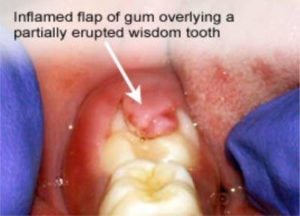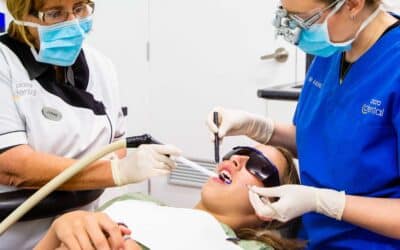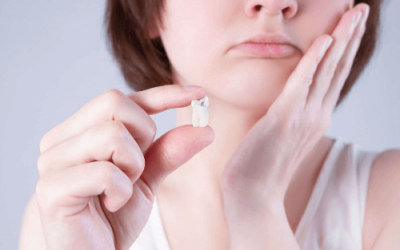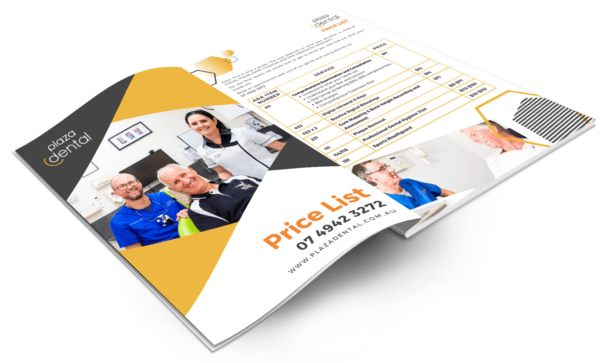When Should Wisdom Teeth Be Removed?
Wisdom teeth myths
Wisdom teeth that cause pain or discomfort is a very common complaint. Often this pain recurs and patients wonder if we should just extract them and solve the problem. However, the only time wisdom teeth should be removed is when the risks of leaving them in are greater than the risks of taking them out.
Risk of leaving or removing wisdom teeth
There are different risks that can occur by leaving wisdom teeth in place. The most common one is an infection. If the wisdom tooth hasn’t come all the way through, then it’s impossible to clean around it properly. This can lead to an infection that presents as swelling and pain in the back of the mouth.

Infected Lower Wisdom Tooth
One of the most obvious signs is that you can’t open your mouth properly and there is a foul taste from the infection that’s underneath the gum. Occasionally, the lymph nodes swell if the infection starts to spread.
Another risk is damage to the tooth in front of the wisdom tooth. Again, if the wisdom tooth isn’t all the way through, it can be hard to clean. That can lead to decay behind the tooth in front of the wisdom tooth.
In either of these situations, the wisdom tooth should be removed. In rare cases, the crown of the wisdom tooth damages the root of the tooth in front. This is a terrible situation as it almost eats away at the adjacent tooth. When this happens, the wisdom tooth needs to be removed and the tooth in front.
We are very conservative when it comes to removing wisdom teeth as it is a surgical procedure, and all surgical procedures carry risks. There’s a chance of a post-operative infection and, if you choose to have a general anaesthetic, that carries its own associated risks.
Possible nerve damage

An OPG shows both jaws in the one x-ray and is useful to check for many things such as developing, teeth, wisdom teeth, periodontal disease.
What concerns us most, in the case of lower wisdom teeth, are the two nerves that run down through the jaw. These nerves supply feeling to all the teeth, the lips and the cheeks. Often the roots of wisdom teeth can be very close to those nerves. It’s imperative to avoid damage to those nerves.
There is also another nerve that runs along the inside of the jaw and gives feeling to the tongue. The bone at this point can be very thin so there can also be a risk of damage to that nerve.
Of course, we take all apropriatef X-rays prior to the procedure so we can evaluate each patient. The structure of the jaw, the placement of the nerves and the depth and shape of wisdom teeth roots vary enormously from person to person.
Invasive procedure
There are many different factors associated with removing wisdom teeth so it’s never taken lightly. It is also a fairly invasive procedure. You’re not going to have your wisdom teeth out and then skip back to work. Every patient is sore and swollen for a few days afterwards
The good news
The good news is that if it is necessary to have your wisdom teeth removed, there are no long-term drawbacks. Wisdom teeth are a relic from when we had a prehistoric diet and the food we ate was more abrasive and fibrous. As the teeth would wear, space would open up and there would be more room for the wisdom teeth to come through. Our jaws also tended to be larger. As we now eat a highly processed diet, we don’t see that degree of wear.
Essentially, we don’t need wisdom teeth and you won’t miss them if they are removed. However, if they need to be removed, it’s essential that it’s done safely with no lasting after-effects.
Dr Steve Pearson is an experienced surgeon who tutors in Oral Surgery to dental students at James Cook University . He is the best person to see if you are concerned about your wisdom teeth. He has a regular general anaesthetic list at the Mater Day Surgery for the removal of wisdom teeth.
The content has been made available for informational and educational purposes only. Plaza Dental does not make any representation or warranties with respect to the accuracy, applicability, fitness, or completeness of the content.
The content is not intended to be a substitute for professional personal diagnosis or treatment. Always seek the advice of your dentist or another qualified health provider with any questions you may have regarding a dental or medical condition. Never disregard professional advice or delay seeking it because of something you have read or seen on the Site.
Services we mentioned:
Related Articles
Can Having Bad Oral Health Affect An Entire Country?
Can Having Bad Oral Health Affect An Entire Country? If it does, it sure makes ignoring and neglecting our oral health...
What Happens to Untreated Wisdom Tooth?
There is one of three things that tend to happen with wisdom teeth.Firstly, they come all the way through, so you can...








